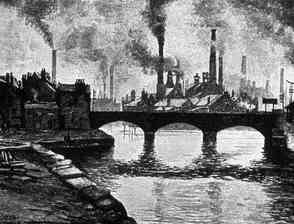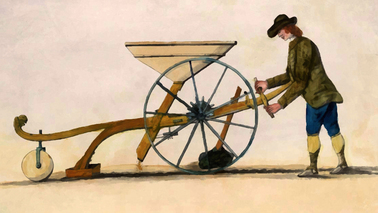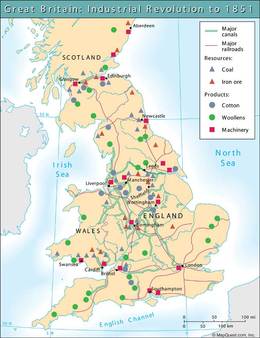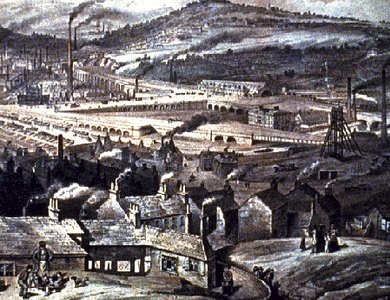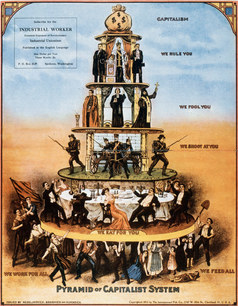Welcome to The Industrial Revolution!
While the French Revolution encouraged political change, a second revolution occurred in Europe, causing rapid economic and social change. In many respects, its effects were even more far-reaching and significant than the effects of the political revolution in France. The Industrial Revolution brought about a fundamental change in society by introducing mass production (the large-scale production of goods) and the use of new sources of power to meet human needs. Science became more closely linked to technology, resulting in a stream of constant innovations. Agricultural society changed into a modern industrial society.
The Industrial Revolution began in Great Britain in the 1750s. It soon spread to the United States and other parts of Europe, and later to the rest of the world. In the WebQuest, you are going to determine the many causes and effects that the Industrial Revolution had on the world.
You will complete the following sections of this webquest and fill out the accompanying activity form:
The Industrial Revolution began in Great Britain in the 1750s. It soon spread to the United States and other parts of Europe, and later to the rest of the world. In the WebQuest, you are going to determine the many causes and effects that the Industrial Revolution had on the world.
You will complete the following sections of this webquest and fill out the accompanying activity form:
- Agricultural Revolution:
- The Industrial Revolution Begins in Great Britain
- Manchester
- Economic Systems
- Industrial Revolution Reforms
| Industrial Revolution Webquest Document | |
| File Size: | 22 kb |
| File Type: | docx |
Introduction
The Industrial Revolution was is one of the greatest turning points in all of human history. Think about the word "Revolution" we usually think of it in turns of a major political shift such as the American War for Independence or the French Revolution. However, this revolution was social and economical. In the video below you will learn how the Industrial Revolution was a turning point. Focus on the word revolution as you watch the video in order to understand why this was such a major turning point in history.
Section 1: The Agricultural Revolution
British farmers introduced scientific methods to agriculture to boost productivity. Fewer people were needed to work on farms and more were available to work in industry. Using the resources below, answer the questions in your packet and determine the significance of each to the Agricultural Revolution.
| The Enclosure System | |
| File Size: | 33 kb |
| File Type: | |
| Crop Rotation | |
| File Size: | 38 kb |
| File Type: | |
Jethro Tull's Seed Drill
Section 2: Why Great Britain?
The Industrial Revolution began in Great Britain for many different reasons such as having geographical advantages, methods of transportation and communication, and the support of a colonial empire. Using the resources below, answer the following questions in your packet and determine the significance of each as a cause of the Industrial Revolution beginning in Great Britain.
Factors of Production Link
Origins of the Industrial Revolution Video
Factors of Production Link
Origins of the Industrial Revolution Video
Section 3: Manchester: The First Industrial City
One of the longest-lasting and most significant impacts of the industrial revolution that took place from the end of the eighteenth century to the beginning of the twentieth century was the mass migration of people from rural areas to cities in a process that has come to be characterized as "urbanization". Urbanization had a profound effect on the daily lives of individuals who found themselves forced into the position of having to adjust from self-sustaining life on farms to life in bigger cities.
The Growth of Industrial Cities
The Growth of Industrial Cities
| Testimony on Child Labor | |
| File Size: | 670 kb |
| File Type: | |
| Excerpt from Charles Dickens's "Hard Times" | |
| File Size: | 160 kb |
| File Type: | |
Section 4: Economic Systems
The Industrial Revolution, to some, was class warfare. The rich were getting richer and the poor were getting poorer. In response to this, different types of economic systems were developed. The following information will give you a better understanding of the world you know-Capitalism, but will also develop your knowledge of Communism and why it appealed to the general masses.
Define Capitalism
Define Laissez-Faire
Define Capitalism
Define Laissez-Faire
| Capitalism: Adam Smith | |
| File Size: | 11 kb |
| File Type: | docx |
Section 5: Reform
There were many negative aspects to the Industrial Revolution, many of which you have already seen. You will read a little about the many reforms that took place that tried to fix the ills caused by the Industrial Revolution.
| Labor Unions and Reforms | |
| File Size: | 300 kb |
| File Type: | |
